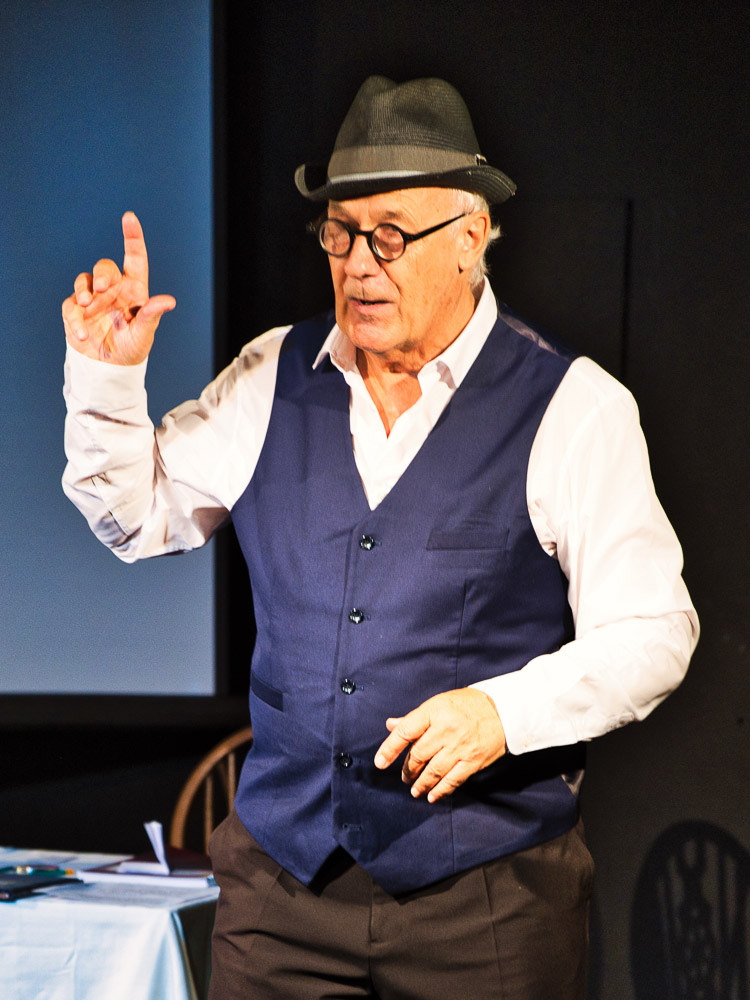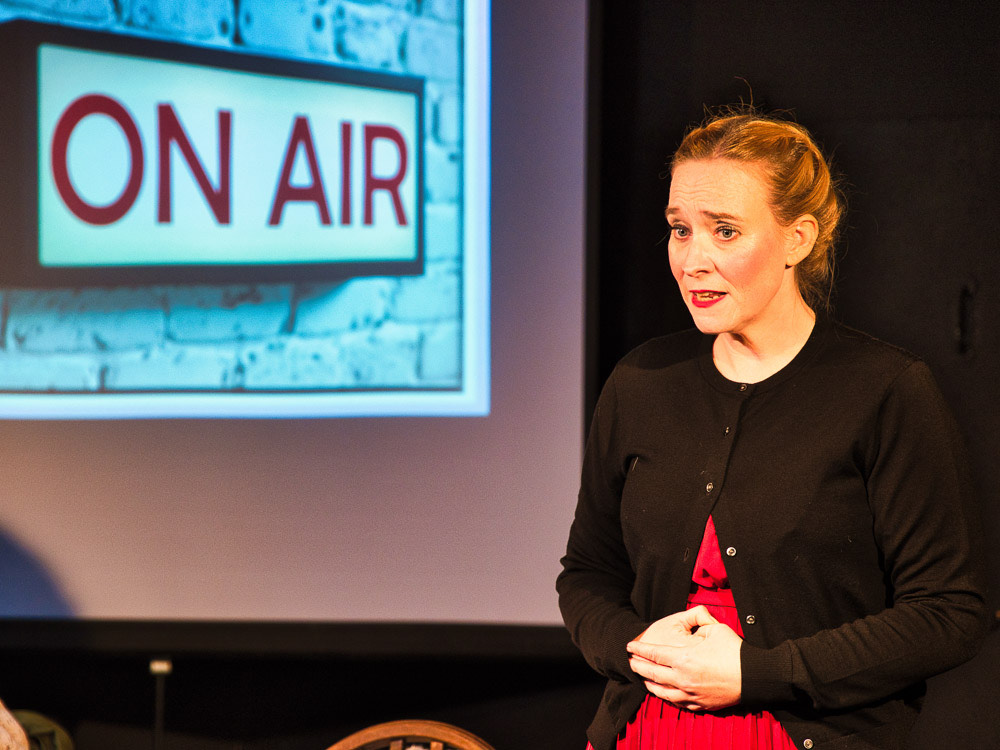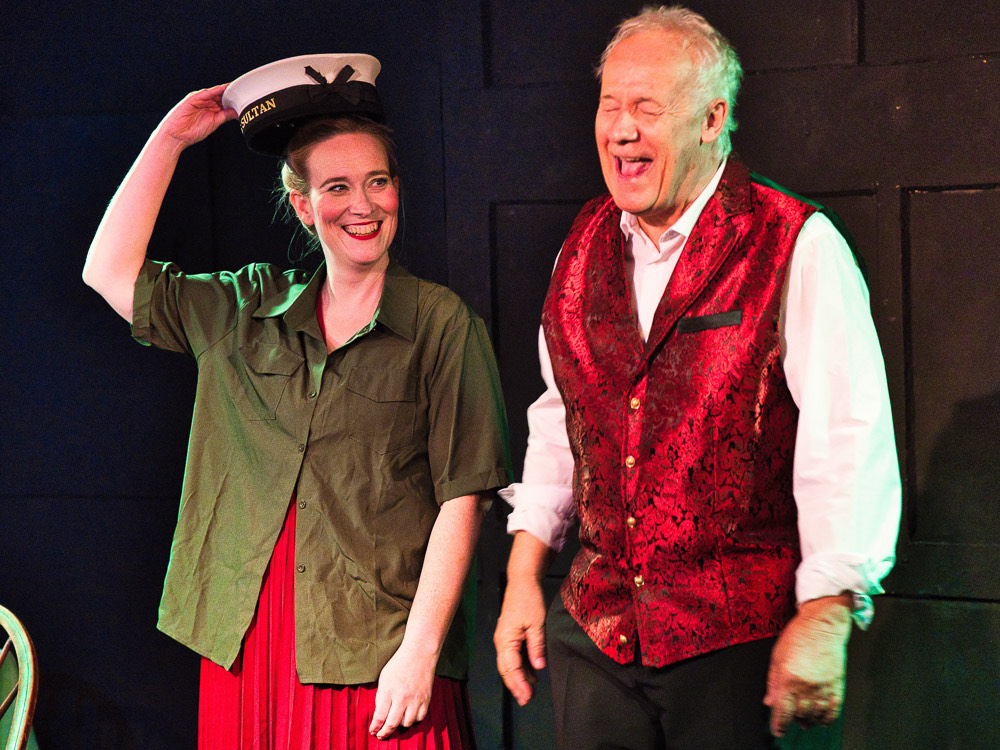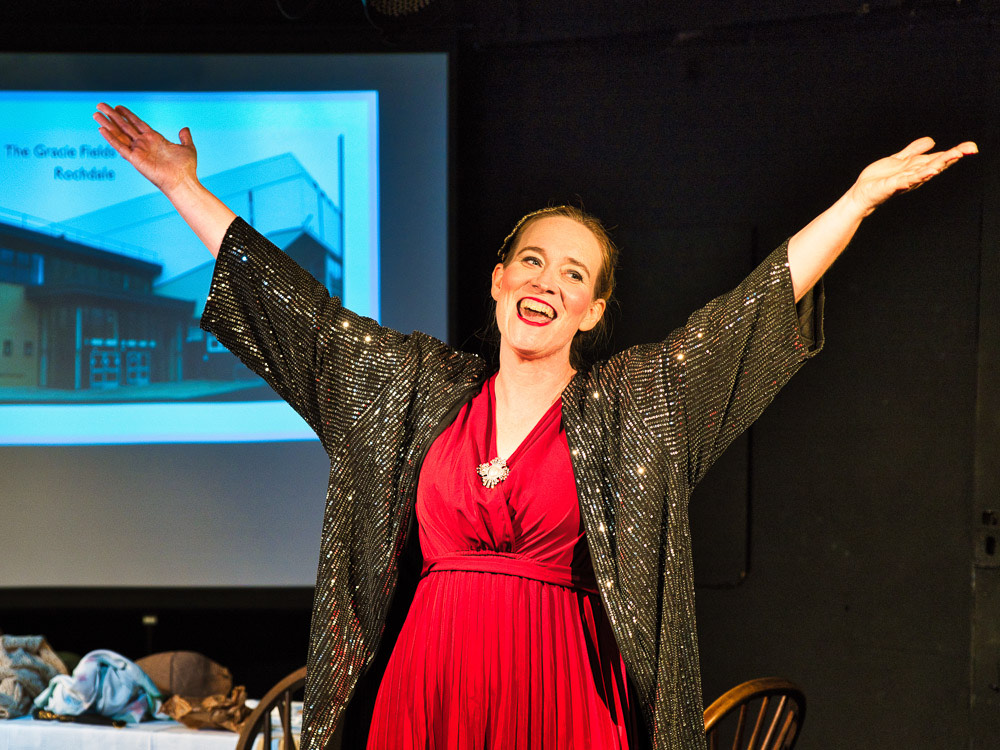Review by Simon Jenner, September 27 2025
★ ★ ★ ★ ★
A man approaches a young woman on a bench in Peacehaven. She’s never heard of Gracie Fields, the name on a small brass plaque. So opens an outstanding show. David Hampshire’s Keep Your Sunny Side Up plays at The Lantern Theatre, directed by Maurice Thorogood and featuring Lisa Rouselle and Hampshire himself till September 27. It’s already going places and is a show to watch when it returns.
As Hampshire introduces her to the headphoned young woman, this is a biopic narration of the life and career of Gracie Fields (1898-1979). There’s fifteen songs including the perennial ‘Sally’, ‘Sing As We Go’, ‘The Isle of Capri’ ‘The Biggest Aspidistra In The World’ and ‘Wish Me Luck (As You Wave Me Goodbye)’.
In a flash Rouselle has exited and returns as ten-year-old Gracie (born Grace Stansfield), auditioning for parts where the minimum age was fourteen. Sheer brass pushes Gracie through and she’s soon in revues such as “Haley’s Garden of Girls” and Clara Coverdale’s “Nine Dainty Dots”. Both Gracie’s sisters went into acting (taking the Fields name too, as opposed to the Stansfield they were born with) and Betty became a film star, but died young in 1938 (it’s not mentioned).

David Hampshire. Photo Credit: David Hampshire and South Coast Theatre.
There’s an early crisis in sexual assault (Hampshire oleaginous in this, and not at all obvious) but Fields finally dusts herself off and makes it to London by winning a five-shilling singing contest to buy the four-shilling fare. Hampshire morphs throughout in accents ranging from Rochdale to Roumamian via London Cockney and Italian. Hampshire’s supporting narration, always discreet is nevertheless a series of characterisations worthy of the brilliance he sets off in Rouselle.
Rouselle is astonishing. To be clear, you might expect the nailing brilliance and indeed heart she brings to her songs, the gnarly wit of her repartees and accent. It’s what you expect of a first-rate performer. Where Rouselle raises this to levels beyond the consummate is in her emotional address, sometimes silent, as events unfold. The first telling one is when the composer of ‘Sally’ who’s written hits like ‘Walter (Take me to the Alter)’ has blagged his way to the now star’s dressing-room. Harry Leon wrote the tune and Leo Towers the not-quite right lyrics. Though a gender needs addressing and a contrast swerving, the way Rouselle listens as Hampshire, as Leon sings the song (when will Rouselle, we might ask?) Rouselle’s face is a quiet and shifting study of rapture. You need to listen to Hampshire, attend to him but keep looking at Rouselle. Thereafter, whatever character is speaking, if Rouselle is on change, you take the temperature of her silence. Another, explosive moment comes later; that too is overwhelming.
Vocally Rouselle is spellbinding too. She clearly possesses the coloratura range, the accenting nailed as she inflects words round the original, but enver slavishly imitating Fields: Rouselle possesses her own soprano voice, with a rich middle range, a ringing top and a way of projecting to the room where you know she could bounce it off the back of a hall.
This is throughout Fields’ marriage of convenience to Archie Pitt, which lasted from the day he gave her champagne on her 18th birthday in 1916, till 1939. It’s a stupefyingly long marriage, too, and you only have to look over the amount of wasted fulfilment throughout (for Fields) to wonder at it. From 1918-1924, they helmed the revue Mr Tower of London, which took Fields to the West End. You can see r relationship slowly shift a Hampshire keeps dismissing Rouselle’s modest request as an growingly frustrated Fields, for an extra pound a week; to baulking at the material Pitt pushes her towards. Against this is the fact that only second to her mother, he believes in Fields’ talent. The Show’s The Thing and Walk This Way followed, but they’re vehicles for minting Pitt and pushing Fields as a wind-up leading lady. It doesn’t help that Pitt all this time has been continuing his affair with music director Annie Lipman who even came up with the last line of ‘Sally’ which needed fixing “you’re more than the whole world to me.” Which Rouselle shows an allergic reaction to, just as she had to a joke once spouted by her abuser. Pitt and Lipman were happy. But there were three in their marriage.
The Hampshire script is adroit and knowing, sometimes bitter with firecrackers. Countering Fields’ accusations of his affair with Lipman just as he’s noted Fields’ affair with John Flanagan, the Irish painter, Hampshire fires back: “It’s as platonic as me and Annie Lipman… Which mightn’t be the best example.” The play’s studded with crisp one-liners, some adapted from source, others invented in the spirit of Fields, and the facts they arise from. Divorcing Pitt (who only died a year later in 1940, though this isn’t mentioned wither) Fields had already fallen for Flanagan. He though has difficulty accepting her money; Hampshire fine at withdrawing into mute resentment with a wisp of lilt vanishing into silence like a put-upon Cheshire Cat. There’s conflict and heartbreak. Again Rouselle gradates the slow slipping grief of realisation and sudden retort.

Lisa Rouselle. Photo Credit: David Hampshire and South Coast Theatre.
Moving to films which she never enjoyed, by 1937 Fields was the highest paid woman actor on the planet, briefly topping even Mae West. The dramas of 1939 which include a life-saving operation and a happy marriage to Italian Monty Banks morphed into incredibly hard war-work. But because Banks was Italian and facing internment in the UK, they gained government permission to move temporarily to the states where Banks took America citizenship. This earned Fields unwarranted bile from the media (nothing changes, especially a working-class girl getting above herself), which the government belatedly rebutted.
The story of Fields’ entertaining troops for ENSA, from before Dunkirk to 86 concerts in 39 days around the UK, and then in the far east, is extraordinary. Not to mention her triumphant and emotional return to London’s Palladium in 1941, terrified she’d be rejected. The factory song round “The thingamebob” song triumphs. A triop to Hannington’s of Brighton with the assistant Adrian entranced is a tiny gem. No wonder Fields slowed down a little afterwards. But her life transforms yet again. There’s an explosion quiet harrowing to watch, and then, a new promise of bliss. With electrical appliances coming to Fields’ aid, unexpectedly. This time it lasts.
With musical supervision by Moody & Moody, staging by Crissy Mullen and tech by the Lantern’s excellent Erin Burbridge, this is in every way a show which exudes glass, perfect synch and co-ordination, bravura and something none of this can guarantee: absolute truth. Costumes are superb and cleverly varied. A couple of chairs, a long table with a gallimaufry of props from hats and scarves to a ukulele, it’s topped by a sparingly-used projector and screen. Perhaps “Peacehaven 1985” as a slide looks a tad bleak in pale teal, but otherwise these are apposite.
Hampshire’s is a detailed script, lasting with an interval two-and-a-half hours. It’s cleverly filleted and never seems too long. There’s a magical quiet song around Fields’ founding an orphanage in Peacehaven for children of theatrical professionals, and proof too that Rouselle can gradate down to a whisper and hold an audience spellbound. The play lasts all Fields’ life. The neat wrap at the end is a small, touching delight.
This is in nearly every way exceptional. Hampshire is consummate and sets off Rouselle as worthy to inhabit Fields. The narrational format limits it as pure drama, but withing that perhaps necessary format it’s as good as it gets. There’s already many plans and offers afoot. Do keep abreast of these, since the return of Keep Your Sunny Side Up will prove prestigious. Since you heard the tip here, it’s worth attending to south Coast Theatre. It deserves an award.
Photo Credit: David Hampshire and South Coast Theatre. Media Production George May.
Lisa Rouselle and David Hampshire. Photo Credit: David Hampshire and South Coast Theatre.



